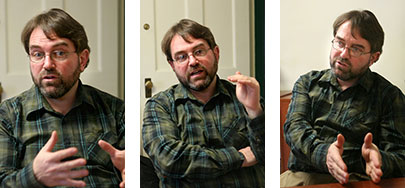Entre Nous with Nigel Roulet, Director, McGill School of Environment
Entre Nous with Nigel Roulet, Director, McGill School of Environment McGill University
User Tools (skip):

"There has been enough of a shift that we observe in our daily lives, that people are concerned about the climate," says Nigel Roulet.
Owen Egan
Entre Nous with Nigel Roulet, Director, McGill School of Environment
No shortcuts for planet's long-term health
On Feb. 2, when the McGill Reporter sat down with Nigel Roulet, director of the McGill School of Environment, he apologized for being all talked out. The James McGill Professor of Geography had been doing non-stop interviews beginning at 6:30 a.m.—immediately after the Intergovernmental Panel on Climate Change (IPCC) released its report on the world's climate. The report, to which Roulet was a contributing author, was blunt in its assessment of the state of the environment, painting a bleak picture of our collective future. Tired as he was, Roulet gave the Reporter an insider's look at the IPCC report and offered some suggestions on what can be done to address climate change.
How long have you been interested in the environment?
I guess it all starts with an interest in mucking about as a boy. I was in Cubs and Boy Scouts at a very early age and although I really hated all the meetings, I loved the camping. As I got older, I did a lot of canoeing—places like Algonquin Park and Northern Canada. It was around then that I began developing an appreciation of the inter-relationship of things. I also started questioning why so many people seem to think that human beings are a priority organism. We're not. We're a biological entity like any other, all governed by the same rules. Yes, we have a brain, but it seems to me that we haven't been using an overabundant amount of it.
Which leads us to the IPCC report that was released in Paris last week. As one of the report's contributing authors, can you give us an overview of the findings?
This is the IPCC's fourth report in 15 years. We've gone from the first report, which said "Yes, we believe that there is climate change and that increasing greenhouse gases do affect temperatures," to this one, in which we say that the evidence for climate change is "unequivocal" and the cause is "very likely" human made. Just as disconcerting is the comment that these changes will be with us for a very, very long time. Even if, by some miracle, we were able to get our greenhouse gas emissions to zero by tomorrow, we would still be faced with the issue of residual gases in the atmosphere that are going to be there for 200, 300 or 400 years.
The earth has faced some pretty big challenges. How does this compare?
We have ice core records that are 650,000 years old that we use for comparisons. The current collection of greenhouse gases in the atmosphere is unprecedented over the last half-million years. We believe that the rate of temperature change that we're experiencing right now has only been matched at times when we have been moving from a glacial to an interglacial period—where there has been very, very rapid changes in climate.
By the sounds of it, car-pooling is but a band-aid on a much larger wound.
The problem lies in our reliance upon fossil fuels to function as a society. Look at this interview. You had a deadline to meet so you jumped into your car and drove out to the West Island to meet me. Had we planned ahead, we could have could have done it on a day when I had come downtown by train for other business. The net differential in CO2 cost is pretty significant. Why are so many people driving SUVs? Certainly they're a status symbol for some, but I think many people drive them because they feel safer. How do we replace that security with a motor vehicle that uses 75 percent less fuel? The real question is, are there enough energy alternatives out there to meet our minimal energy requirements to function as a society?
Honestly, I think we're going to need some yet-to-be-determined technologies, either in new forms of energy, or technologies that enable us to capture and sequester the carbon that we are releasing into the atmosphere.
What are universities' roles in this?
First of all, we should challenge our students to take the lead on this. We should ask our economics students, "What will be the consequences of the actions you are taking today to the world in 100 years?" In philosophy courses we should ask, "What is our moral obligation to future generations?" We have to stop thinking about the environment as a fringe subject, it should be front and centre. Chemists should be thinking about the environment, engineers should be thinking about the environment—everybody should. Ideally, one day we will no longer need a School of Environment because it will have been entrenched in our culture.
Second, as an institution, I think McGill should set a goal for itself to be completely sustainable within a decade or two. That means all material and energy that flows in should equal the material and energy that flows out in one converted form or another.
I don't think many universities today would fare very well in an environmental audit or sustainability audit, including McGill. We are rightfully proud of our status as a world-class university, but we need to take the long view on environmental issues because if we don't, who will?

